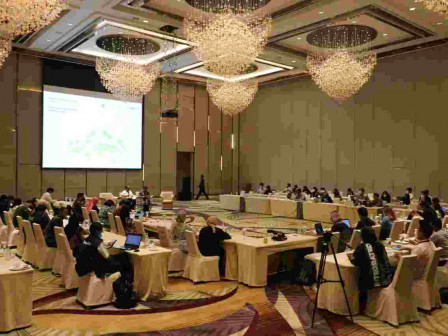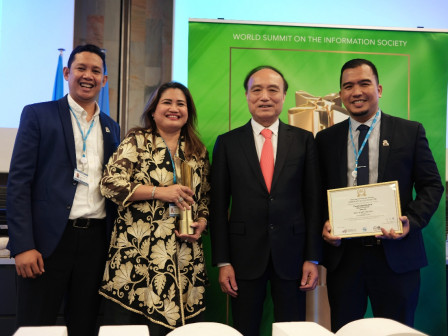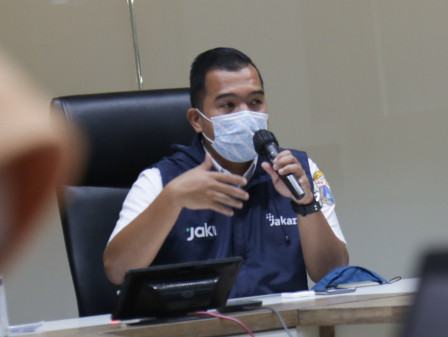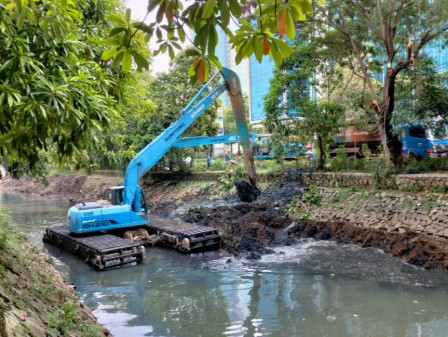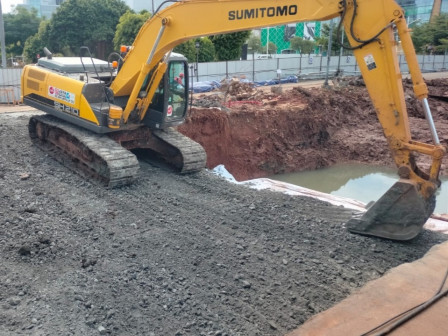Jakarta - Cities4Forest Implements Nature-Based Solutions for Environmental Management
Reported by Folmer | Translated by Nugroho Adibrata
The Jakarta administration together with the Cities4Forest and World Resource Institute (WRI) Indonesia held a Public Consultation with the theme "Utilizing Nature-Based Solutions (NbS) for Jakarta Residents", at the Westin Hotel, Jakarta, Wednesday (7/6), which is followed by a Taman Exploration activity to see the Nbs concept in Langsat Park, South Jakarta. The administration fully supports various efforts to increase the implementation and integration of the NbS Approach for Green Open Space (RTH) in Jakarta.
We already have a program related to how green and blue infrastructure is integrated into a place
As for the information, the administration collaborated with Cities4Forests to integrate the NbS approach in programs to deal with problems faced by residents, including floods and air pollution. Its approach is often applied in cities around the world to strengthen the role of nature in the development of urban supporting infrastructure.
NbS is an approach that prioritizes strengthening the role of nature to mitigate various natural disasters and the impacts of other climate crises. It allows for a holistic approach that results in multiple benefits simultaneously which is very important considering that cities often have very limited land.
Jakarta Smart City Wins IDC Awards for Flood Control System InnovationThus far, the related agencies already have programs such as the integration of natural functions in the form of multifunctional green open space which not only provides recreational functions but can also assist flood management and improve air quality.
There are more than 90 green open spaces that have retention ponds that function to manage water during high rainfall. Even parks also developed with the NbS approach, such as Tebet Eco Park, Langsat Park, Dukuh TMB, Puring Park, and so on.
Langsat Park has a retention pond that can reduce the risk of flooding. Under normal conditions, the pond will dry up thus it can become a recreational facility for residents who visit the park. However, if the rainfall is high and it exceeds the capacity of the river, the pond will be inundated and accommodate the rainwater runoff. Aside that, the park area that is maintained also supports the life of various biodiversity in it.
“We already have a program related to how green and blue infrastructure is integrated into a place, and how to optimize the assets we have and collaborate with relevant stakeholders and the community. We have implemented retention ponds, water storage, and flood storage in many small parks around Jakarta," explained Parks and Planning Division Head Hendrianto, Thursday (7/7).
Aside that, the Jakarta Water Resources (SDA) Agency also applied the NbS for various flood control infrastructures that are being developed. "We are currently revitalizing polders, reservoirs, and rivers by implementing the NbS concept in them, which not only functions to control flooding but also becomes a public space for community activities," explained Planning Affairs Sub-Coordinator for Flood Management and Drainage Supratman.
"With this cooperation, we can see and understand hydrological aspects and areas that have the potential for implementing the NbS concept, especially for flood management," he added.
On the other hand, NbS has also been institutionalized through several related regulations such as Gubernatorial Regulation number 17/2017 on City Forest; Governor Instruction number 52/2020 on the Acceleration of Improved Flood Control Systems in the Era of Climate Change; Gubernatorial Regulation number 24/2021 on Tree Management and Protection; Gubernatorial Regulation number 49/2021 on Provision and Utilization of Park; and Gubernatorial Regulation number 9/2022 on green open space which also includes the green open space master plan.
Since 2018, Jakarta has been a member of the Cities4Forests initiative, a coalition that promotes peer-to-peer learning to improve the relationship between cities and their forests and provides technical support related to local policy formulation, and other communication activities. Jakarta is one out of more than 70 cities on six continents around the world that are members of Cities4Forests.
Collaborations that have been carried out by Cities4Forests with Jakarta include mapping of green open spaces, tree inventory, studies related to flooding, and capacity building related to the Nature-Based Solution approach.
The NbS approach has the potential to be applied in other cities in Indonesia, with various adjustments that are tailored to the conditions of each city. We currently support 8 cities in Indonesia, namely Jakarta, Semarang, Manokwari, Jayapura, Pekanbaru, Medan, Balikpapan, and Denpasar. We (WRI Indonesia and Cities4Forests) are ready to help other cities to strengthen the relationship between the city and its natural surroundings,” said WRI Indonesia Hydrologist for Cities4Forests Yudhistira Pribadi.
The benefits of NbS have also been felt by various cities in the world. In Singapore for instance, the transformation is conducted by restoring the natural flow of the river in a bid to create a floodplain that can hold more water when it rains. In addition, the Sponge Cities concept in China seeks to provide more space thus rainwater can be absorbed into the ground before being channeled into drainages.

